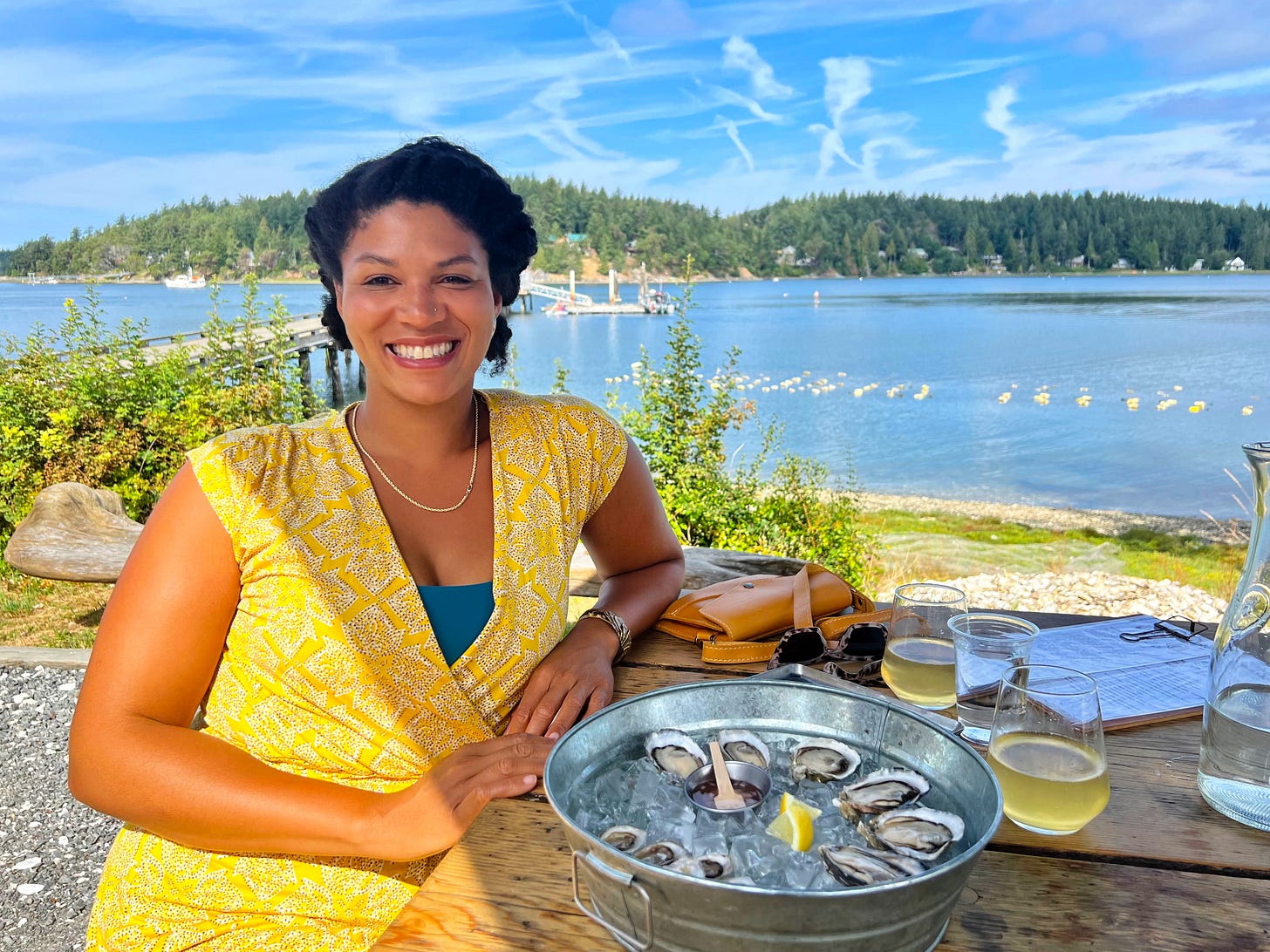In the next few posts, Jamie and I will introduce ourselves and the concepts behind some of the forms Fish Forward will take. I’ll go first.
Hi! I’m Aja.

I’m a first generation child of hardworking Caribbean immigrants. I fell hard in love with the ocean early in life. I wanted to be a marine biologist, but during my studies learned that the complexity of the human relationship to the ocean was more interesting to me than scientific research. I was lucky to learn that environmental policy in general, and fisheries policy in particular, was a great way to apply my passions. This all led to a nearly 20-year career working in U.S. fisheries management.
Hand-in-hand with working in fisheries – I ADORE seafood. If seafood is an option on a menu, that’s what I order. I especially love all the tomato brothy Cioppino-like soup variations the world offers. I like raw seafood – oysters and sushi and poke. The only seafood I don’t eat is octopus – they’re probably smarter than us and maybe are aliens?
I’m not a pescitarian, but I am unlike typical Americans in my preference for fish. We eat a lot of animal protein in the United States. Americans choose seafood less than other animal protein sources (22 kg seafood in 2022 per capita vs 30+ kg poultry, beef, and pork - actual consumption is likely less), and eat less seafood per capita as a percentage of overall animal protein consumption than most other regions worldwide.

U.S. availability per person for seafood has also not changed much in decades, despite advances in seafood preservation technology, and the decades-long availability of tinned fish.
I know that my individual restaurant orders and fishmonger purchases will not move the needle on U.S. consumer demand for seafood. I keep at it because it is healthy, delicious, and I’m trying to do my part for the U.S. fishermen and fishing communities that continue to capture my heart. I’ve had the pleasure of working with fishermen across the country for nearly two decades. Fishermen are creative, enterprising, and resourceful. They can read the ocean. They are some of the best, most devoted stewards of our natural world. I’ve lived in a small fishing town with multi-generation fishing families. I’ve worked with giant vertically integrated fishing companies. In every fisheries setting I’ve experienced, there’s shining pride and community around the work. It’s a noble and ancient profession that feeds people. I want people to be proud and honored to eat fish caught by U.S. fishermen. I want to share the excitement I have for seafood every day.
I get why people outside of my professional sphere don’t confidently eat fish. Fish are confusing. There are so many! What do I buy? Is farmed ok? Is it bad that it was previously frozen? Does it matter where it was farmed or caught? It’s expensive and worrisome to overcook something delicate at home. Sometimes there are bones and shells and other too-recognizable parts. Sometimes fish tastes…fishy. With all those thoughts clanking around, I understand why it feels safest to stick to appendage-less chicken breasts that surrender to the flavor of whatever sauce they’re cooked in.
There are some people who just ignore fish and quietly never choose it. Others turn into armchair fisheries policy makers and marine biologists to reject seafood options. “Farmed fish is filled with antibiotics.” “I don’t eat fish because fishermen bring up turtles and other precious creatures in the nets, and toss small, inedible fish back over the sides.” ”The ocean is so polluted, I can’t eat fish from it.” “The ocean is empty and fish stocks everywhere have collapsed.” And then in the next breath, they’ll order a burger from any random establishment without a second thought. People simply do not interrogate their chicken thighs and pork tenderloins the way they interrogate fish. And gosh, the stories they’re telling are super bleak and not entirely true.
I absolutely *love it* when a seafood novice friend turns to me and lowers their voice to ask that “dumb” seafood question that’s been kicking around in their head. I’ve certainly never had all of the answers for anyone. However, I do have a stronger knowledge foundation, a network, and the pure interest to form a complete and nuanced answer.
So – that is what we’d like to do with Fish School.
What is Fish School?
Among other things, Fish School will feature lessons on sustainable fisheries management and seafood sourcing. Ask us your fish questions, and we’ll offer you a well researched, plain language answer! We’ve got a few ideas already in the hopper, but want you, as a community, to drive this feature. No question is too small! Some questions are too large! There are no stupid questions!
At times, we’ll tie a Fish School post to a region-specific issue we’d like to explore, or use the opportunity to highlight an event we think you may find interesting.
Here are some example questions that are already on the list:
What is a fishery? (Hint: It is not a hatchery.)
What makes seafood “sustainable”?
Can I eat oysters in months that aren’t spelled with an “R”?
Can I eat seafood away from the ocean, say, in the Midwest?
What questions do you want us to explore in Fish School? What stops you from choosing to cook fish at home? What stops you from choosing fish at restaurants?
Tell us in a comment!







